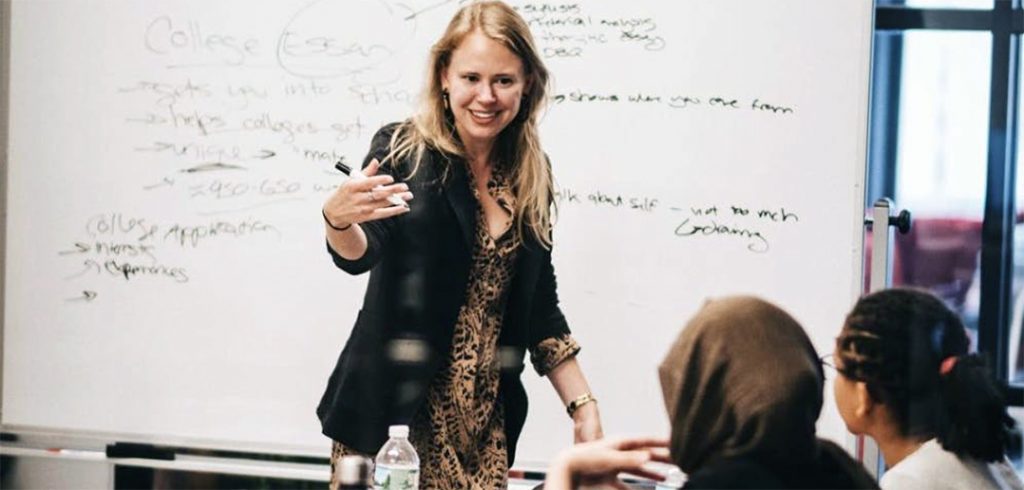Gafney arrived at Fordham two years ago as the center’s director of administration and academic development after several years in higher education as an instructor, administrator, and independent consultant. She started during a time of restructuring within the Office of Mission Integration and Planning, which included launching the center to bring together established community outreach programs alongside service learning curricula.
Gafney will now oversee marquee programs like Urban Plunge, the pre-orientation program that introduces first-year students to the city through service, and Global Outreach, which partners with community-based organizations at home and abroad to help students better understand social justice issues at the ground level. On the academic side of the house, Gafney will continue to build on her work with faculty to facilitate curricular offerings that include engagement with the community.
“My background it the humanities and the liberal arts laid out a path where I fell in love with teaching, but then I began to look at more systemic ways to create policies that put relationships with people first, which is essential in education,” she said.
A graduate of Tufts University and the University of Chicago, Gafney earned her doctorate from the City University of New York Graduate Center. Mentoring and teaching students at Hunter College and John Jay College sparked an interest in student success.
“I began asking questions about what gets students into college, how they persist, and what they need to complete college on time,” she said.
She later consulted for colleges and universities throughout New York state to develop and evaluate STEM programs with the ultimate goal of recruiting students from historically underrepresented backgrounds. Having fostered an interest in the nut-and-bolts of higher education, she arrived at Fordham tasked with growing the University’s community-engaged approach to coursework, she said.
“A community engaged class takes up a social justice concern or problem or topic and applies it to that class through community engagement,” she said. “It could be an organic chemistry class that deconstructs an environmental justice issue or a sociology class that examines redlining.”
Gafney said that while there was a strong tradition of service learning at Fordham when she arrived, the Center for Community Engaged Learning offers many more opportunities for students to get involved in community-based work through their undergraduate courses. Today, community engaged learning classes to ask each student to take on a direct service or project-based experience, along with two written assignments and a thoughtful reflective practice, such as journaling or a set of in-class discussions that unpack their experience.
These courses have increased in number dramatically as well. In the 2014-2015 school year there were seven service learning courses offered; this school year there were 52 community engaged courses supported by the center. Gafney credited several faculty members–whom she referred to as “expert practitioners”– with helping lay the groundwork for what is now a wide array of course offerings across disciplines.
CCEL provides support to faculty by connecting them with appropriate community based organizations that have an established relationship with Fordham. Gafney also facilitates faculty workgroups that meet eight times a semester to workshop course proposals. The group delves into the pedagogy of teaching a community-based course, she said, and “interrogates systems of racism” while discussing how to hold those difficult conversations in a classroom. The fact that she is a white woman facilitating conversations on race has not been lost on her.
“I am approaching a lot of this work as a student and learning from my staff, other leaders in the field, and from our partners,” she said. “I see this learning and developing myself as iterative, under construction, and something that I must return to every day.”
On her nightstand at the moment are books by Ibram Kendi, Michelle Alexander, and Bryan Washington, she said.
“I’m deeply committed to anti-racism in everything I do,” she said, after crediting several colleagues from across the University who she said have helped her deepen her understanding of racism. She added that the pandemic and recent Black Lives Matter protests have underscored inequities that CCEL has sought to address in its programming.
“Even more than in ordinary times, we really see the importance of community-based solutions,” she said. “We’ll be looking to our partners to see how they’re approaching this political, cultural, and social change, as well as a rising awareness around injustice and human rights violations in this country.”
Gafney said that the post-pandemic world could offer society an opportunity to realign its principles. She drew parallels to her research on 14th-century secular writing in England, France, and Italy to what that world might look like. She noted that in years after the plague, writers often employed the motif of the Garden of Eden as a stand-in for a newly constructed society.
“It was a way to think about how to construct a new society after the destruction of an urban society,” she said. “Then as now I hope for a restructuring of problematic hierarchies, like who has power and how it is used. Because in these moments of flux that we don’t wish for, that is when we can re-valuate what is possible.”

